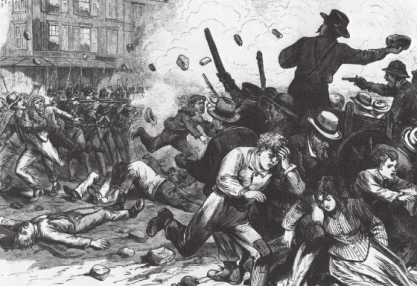It’s not every day you have the exact date and moment two historical figures meet for the first time. Most meetings are inconsequential when they happen, and it’s only in hindsight that these people realize how important that meeting was to them. Sometimes there’s a mention in a diary, or a letter. Often, nothing is said at all, and slowly but surely the meeting grows into a lifelong friendship, or true love, or even a lifelong feud. That moment in time can become the most important moment in a person’s life, and they won’t even realize it. The study of meetings in the present, then, is often met with great challenges. Some historical figures meet at their work. Or while attending school. Friendships grown slowly. Many times, the meetings can be mundane.
Sometimes, though, two people will meet in the most unlikely of circumstances.
Like at a riot.

Broad Street Riot, courtesy Library of Congress
On June 11, 1837, a group of protestant firefighters got into
a fight with an Irish funeral procession, and the fight escalated quickly from there. The scene completely descended into chaos, and by the end thousands of people were involved in the overall conflict. This is including the militia, the marines, the civilians, and of course the people instigating the fight in the first place. It is considered the worst riot in Boston’s history, which is saying something.
This is the backdrop for one fateful meeting.



